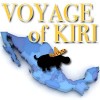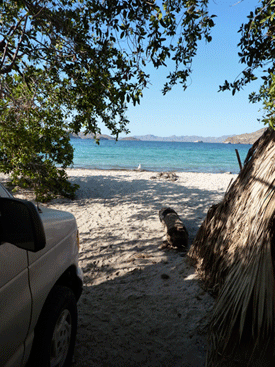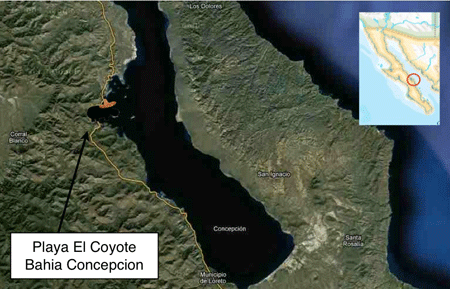A stop along the way sparks childhood memories for the Voyage of Kiri.
Location: Near the calm blue waters of Bahia Concepcion, an hour south of Mulege.
Conditions: Under the canopy of a few highly prized trees, sheltered from the hot sun, with just the slightest breeze over the water.
Discussion: I nudged Alyssum, saying, “You’ve got to see this.” I had to interrupt my co-pilot’s power nap to see the string of bays below us, shining in impossible colors. Each turn of the road winding along steep cliffs drew gasps. We finally chose our destination, Playa El Coyote.
The dirt road meandered down to the beach, along a cobblestone path that was partially flooded during high tide, the flat blue sea to our left and steep hillside to our right. There was nobody around as we crept under the shade of two billowing trees, the water lapping just feet away. El Hippo did not move for three days — we were taking a vacation.

Like two kids, we swam with our snorkels in the warm water, peering at fish and rays, going ever further to see “what’s around the next bend.” It reminded me of a favorite place from my childhood — an island where my grandparents had a small house. We’d get there by hiring a boat ride from a fisherman, and we’d unload boxes of supplies for the week. There was no electricity, only oil lamps, and the water pump would regularly break. But it was very special.
The trees surrounding the island were thick and full of birds; when I put on a diving mask, they turned upside down, into forests of seaweed and fish. I’d follow my older brother and cousins swimming from beaches to distant coves, like I was doing now, exploring rocky outcroppings full of strange life. One day, they circumnavigated the island and came back with stories of snakes and freshwater pools. I listened enviably, because I was too young to join them in the adventure.

Childhood dreams have a way of turning into values without us even noticing. Over time, the conservation of coastlines became important to me. Everyone develops values based on personal inclinations. If you grow up trout fishing in streams, you might oppose industrial waste being poured in the river. If you live in the city, a nearby park with big trees is pleasing; smoggy air isn’t. That is the microcosm you are concerned with.
One of the insights from ecology is that our microcosm depends on a broader macrocosm. Our ability to eat grilled fish on Friday nights might be interrupted by any number of things: Waste being washed down from pig factories; sunlight being blocked by sediment from deforested hillsides eroding into rivers; excess fertilizer from farmlands eating up the oxygen in the water; or unregulated over-fishing. Every issue is connected.

If nothing else, the phenomenon of climate change has made millions of people aware that all systems are interconnected. Like nodes in a network, when each microcosm is intact, the macrocosm can function. If I could modify the cliché, it would be: “Think global, act local — be ecological.”
Although our lovely Playa El Coyote was empty at first, on Sunday a dozen families descended on the Bahia Concepcion to escape the heat from nearby towns. Music whined from car stereos, kids screamed and ran around. One guy on a loud ATV kept doing laps around the beach like it was a racecourse. Beer cans were thrown in the water. I was irritated and went on a long swim.
When I returned, a group of kids was giggling on a kayak. I smiled. Maybe they’ll remember this, and want to keep it alive, I thought. Maybe they will dream about this when they are older.





